Critical Analysis: Management Theories and Assumptions in Leadership
VerifiedAdded on 2023/02/01
|13
|3592
|69
Essay
AI Summary
This essay critically examines the systems management theory, focusing on the assumptions made by leaders and how they impact management styles and workplace environments. It explores the theory's assumptions, which emphasize collaboration and integration among employees to enhance organizational efficiency. The essay argues that leaders often contradict these assumptions due to factors like lack of trust, poor communication, and an authoritative leadership style, thereby affecting the collaborative functioning of the systems. It highlights the contradictions between a leader’s assumptions and the systems theory, which can lead to challenges such as reduced employee engagement, lack of transparency, and an increased rate of employee attrition. The essay concludes by emphasizing the importance of aligning leadership practices with the core assumptions of the theory to create a more effective and collaborative work environment, ultimately enhancing organizational performance and innovation. The essay discusses how the lack of communication between stakeholders and organizational leaders affects the innovation process. It also mentions the impact of contingency situations on the modifications of the theory. The essay also discusses the lack of transparency in business operations and how this can challenge the systems theory towards an integrated approach. The essay also explains how the lack of suitable communication among the stakeholders and the organizational leaders affected the capabilities of the organizations in maintaining the efficiency of the operations in adherence to the demand of sustenance.
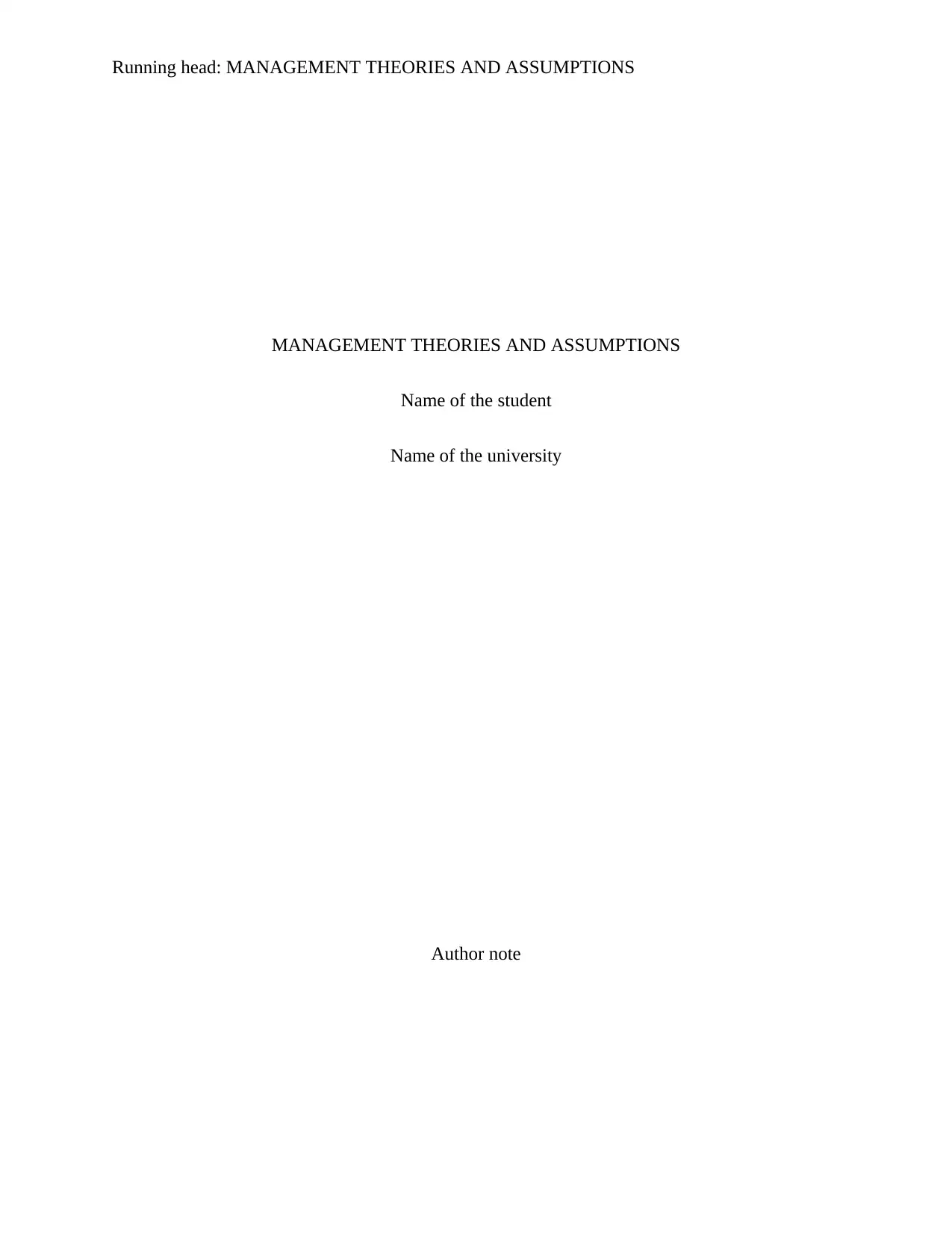
Running head: MANAGEMENT THEORIES AND ASSUMPTIONS
MANAGEMENT THEORIES AND ASSUMPTIONS
Name of the student
Name of the university
Author note
MANAGEMENT THEORIES AND ASSUMPTIONS
Name of the student
Name of the university
Author note
Paraphrase This Document
Need a fresh take? Get an instant paraphrase of this document with our AI Paraphraser
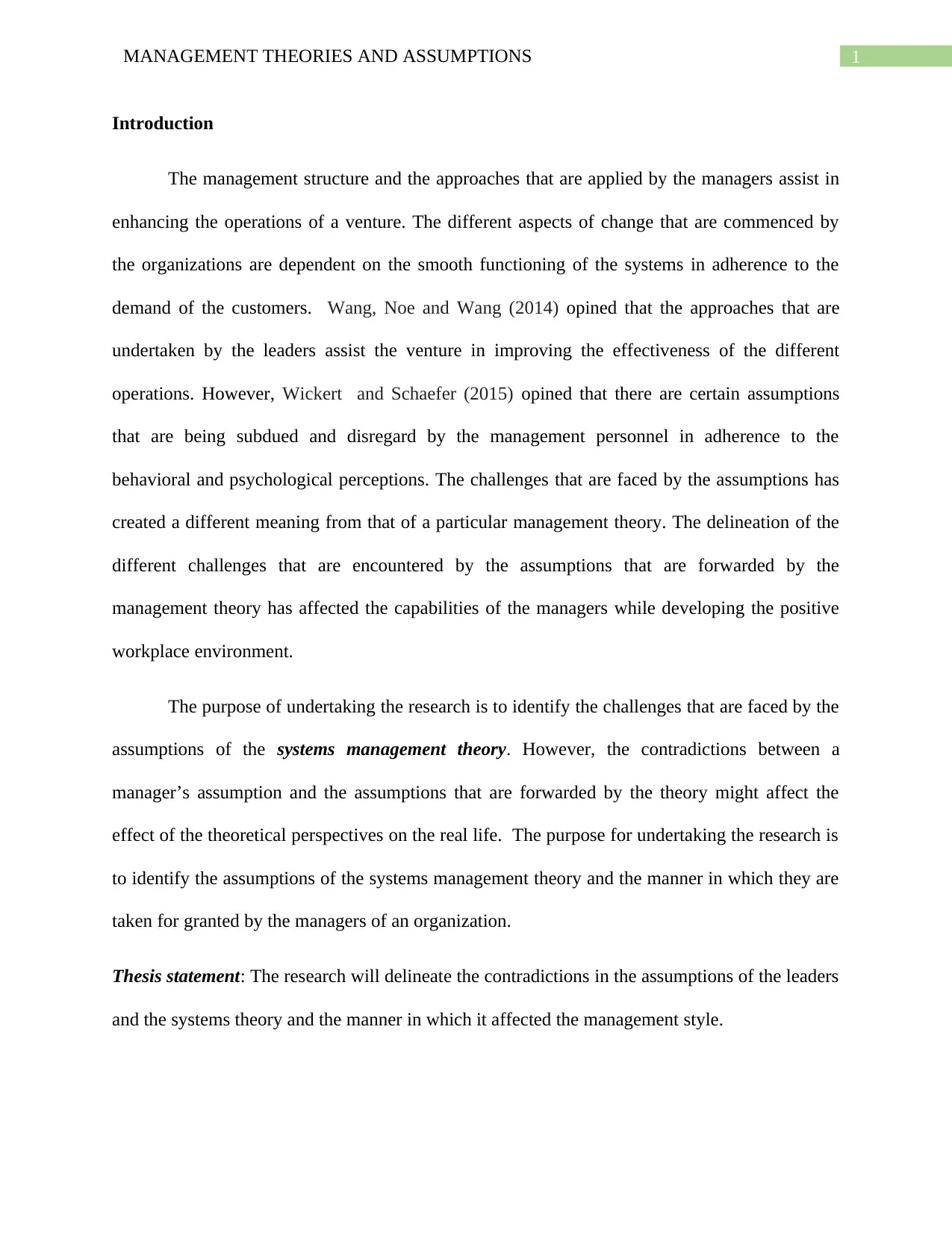
1MANAGEMENT THEORIES AND ASSUMPTIONS
Introduction
The management structure and the approaches that are applied by the managers assist in
enhancing the operations of a venture. The different aspects of change that are commenced by
the organizations are dependent on the smooth functioning of the systems in adherence to the
demand of the customers. Wang, Noe and Wang (2014) opined that the approaches that are
undertaken by the leaders assist the venture in improving the effectiveness of the different
operations. However, Wickert and Schaefer (2015) opined that there are certain assumptions
that are being subdued and disregard by the management personnel in adherence to the
behavioral and psychological perceptions. The challenges that are faced by the assumptions has
created a different meaning from that of a particular management theory. The delineation of the
different challenges that are encountered by the assumptions that are forwarded by the
management theory has affected the capabilities of the managers while developing the positive
workplace environment.
The purpose of undertaking the research is to identify the challenges that are faced by the
assumptions of the systems management theory. However, the contradictions between a
manager’s assumption and the assumptions that are forwarded by the theory might affect the
effect of the theoretical perspectives on the real life. The purpose for undertaking the research is
to identify the assumptions of the systems management theory and the manner in which they are
taken for granted by the managers of an organization.
Thesis statement: The research will delineate the contradictions in the assumptions of the leaders
and the systems theory and the manner in which it affected the management style.
Introduction
The management structure and the approaches that are applied by the managers assist in
enhancing the operations of a venture. The different aspects of change that are commenced by
the organizations are dependent on the smooth functioning of the systems in adherence to the
demand of the customers. Wang, Noe and Wang (2014) opined that the approaches that are
undertaken by the leaders assist the venture in improving the effectiveness of the different
operations. However, Wickert and Schaefer (2015) opined that there are certain assumptions
that are being subdued and disregard by the management personnel in adherence to the
behavioral and psychological perceptions. The challenges that are faced by the assumptions has
created a different meaning from that of a particular management theory. The delineation of the
different challenges that are encountered by the assumptions that are forwarded by the
management theory has affected the capabilities of the managers while developing the positive
workplace environment.
The purpose of undertaking the research is to identify the challenges that are faced by the
assumptions of the systems management theory. However, the contradictions between a
manager’s assumption and the assumptions that are forwarded by the theory might affect the
effect of the theoretical perspectives on the real life. The purpose for undertaking the research is
to identify the assumptions of the systems management theory and the manner in which they are
taken for granted by the managers of an organization.
Thesis statement: The research will delineate the contradictions in the assumptions of the leaders
and the systems theory and the manner in which it affected the management style.
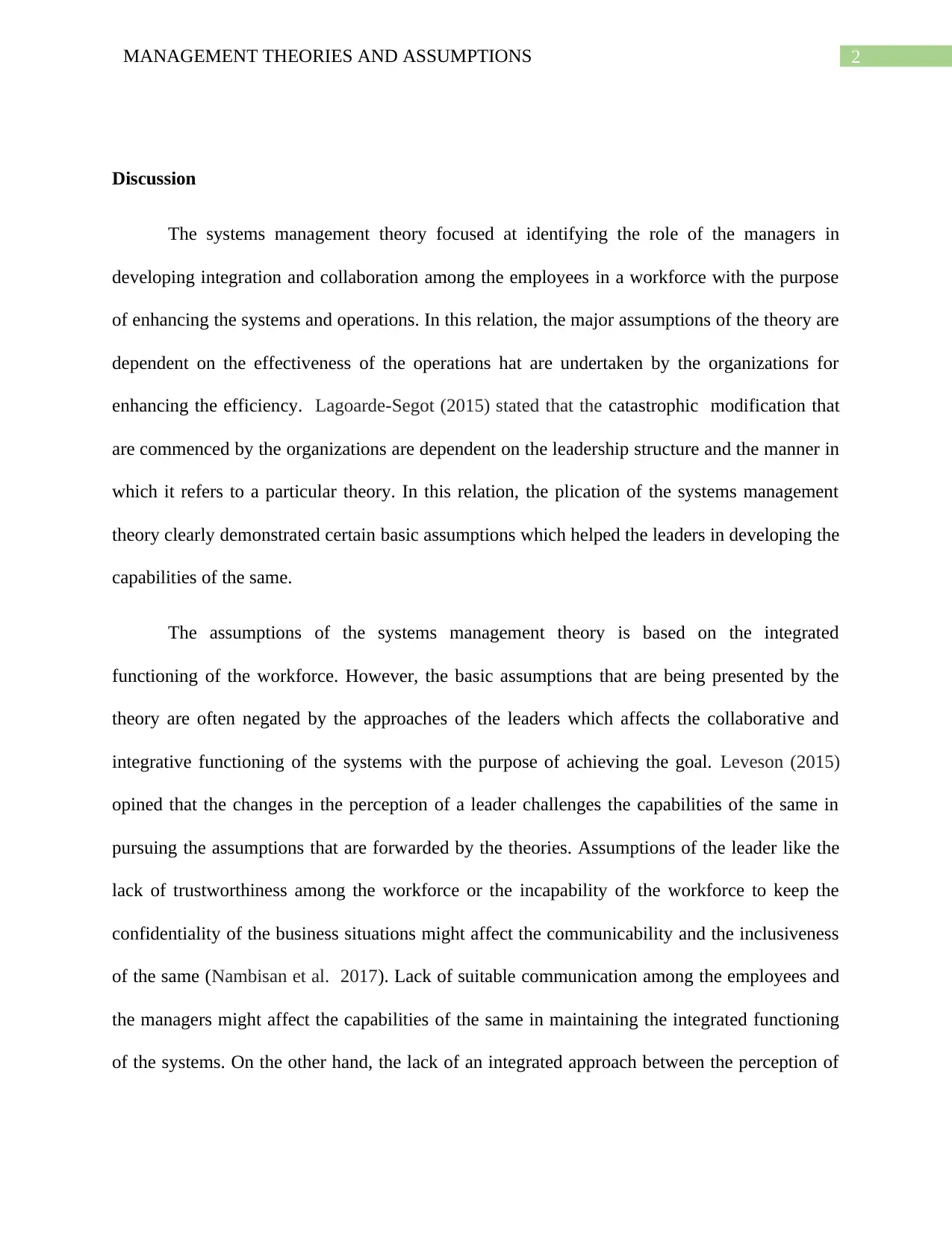
2MANAGEMENT THEORIES AND ASSUMPTIONS
Discussion
The systems management theory focused at identifying the role of the managers in
developing integration and collaboration among the employees in a workforce with the purpose
of enhancing the systems and operations. In this relation, the major assumptions of the theory are
dependent on the effectiveness of the operations hat are undertaken by the organizations for
enhancing the efficiency. Lagoarde-Segot (2015) stated that the catastrophic modification that
are commenced by the organizations are dependent on the leadership structure and the manner in
which it refers to a particular theory. In this relation, the plication of the systems management
theory clearly demonstrated certain basic assumptions which helped the leaders in developing the
capabilities of the same.
The assumptions of the systems management theory is based on the integrated
functioning of the workforce. However, the basic assumptions that are being presented by the
theory are often negated by the approaches of the leaders which affects the collaborative and
integrative functioning of the systems with the purpose of achieving the goal. Leveson (2015)
opined that the changes in the perception of a leader challenges the capabilities of the same in
pursuing the assumptions that are forwarded by the theories. Assumptions of the leader like the
lack of trustworthiness among the workforce or the incapability of the workforce to keep the
confidentiality of the business situations might affect the communicability and the inclusiveness
of the same (Nambisan et al. 2017). Lack of suitable communication among the employees and
the managers might affect the capabilities of the same in maintaining the integrated functioning
of the systems. On the other hand, the lack of an integrated approach between the perception of
Discussion
The systems management theory focused at identifying the role of the managers in
developing integration and collaboration among the employees in a workforce with the purpose
of enhancing the systems and operations. In this relation, the major assumptions of the theory are
dependent on the effectiveness of the operations hat are undertaken by the organizations for
enhancing the efficiency. Lagoarde-Segot (2015) stated that the catastrophic modification that
are commenced by the organizations are dependent on the leadership structure and the manner in
which it refers to a particular theory. In this relation, the plication of the systems management
theory clearly demonstrated certain basic assumptions which helped the leaders in developing the
capabilities of the same.
The assumptions of the systems management theory is based on the integrated
functioning of the workforce. However, the basic assumptions that are being presented by the
theory are often negated by the approaches of the leaders which affects the collaborative and
integrative functioning of the systems with the purpose of achieving the goal. Leveson (2015)
opined that the changes in the perception of a leader challenges the capabilities of the same in
pursuing the assumptions that are forwarded by the theories. Assumptions of the leader like the
lack of trustworthiness among the workforce or the incapability of the workforce to keep the
confidentiality of the business situations might affect the communicability and the inclusiveness
of the same (Nambisan et al. 2017). Lack of suitable communication among the employees and
the managers might affect the capabilities of the same in maintaining the integrated functioning
of the systems. On the other hand, the lack of an integrated approach between the perception of
⊘ This is a preview!⊘
Do you want full access?
Subscribe today to unlock all pages.

Trusted by 1+ million students worldwide
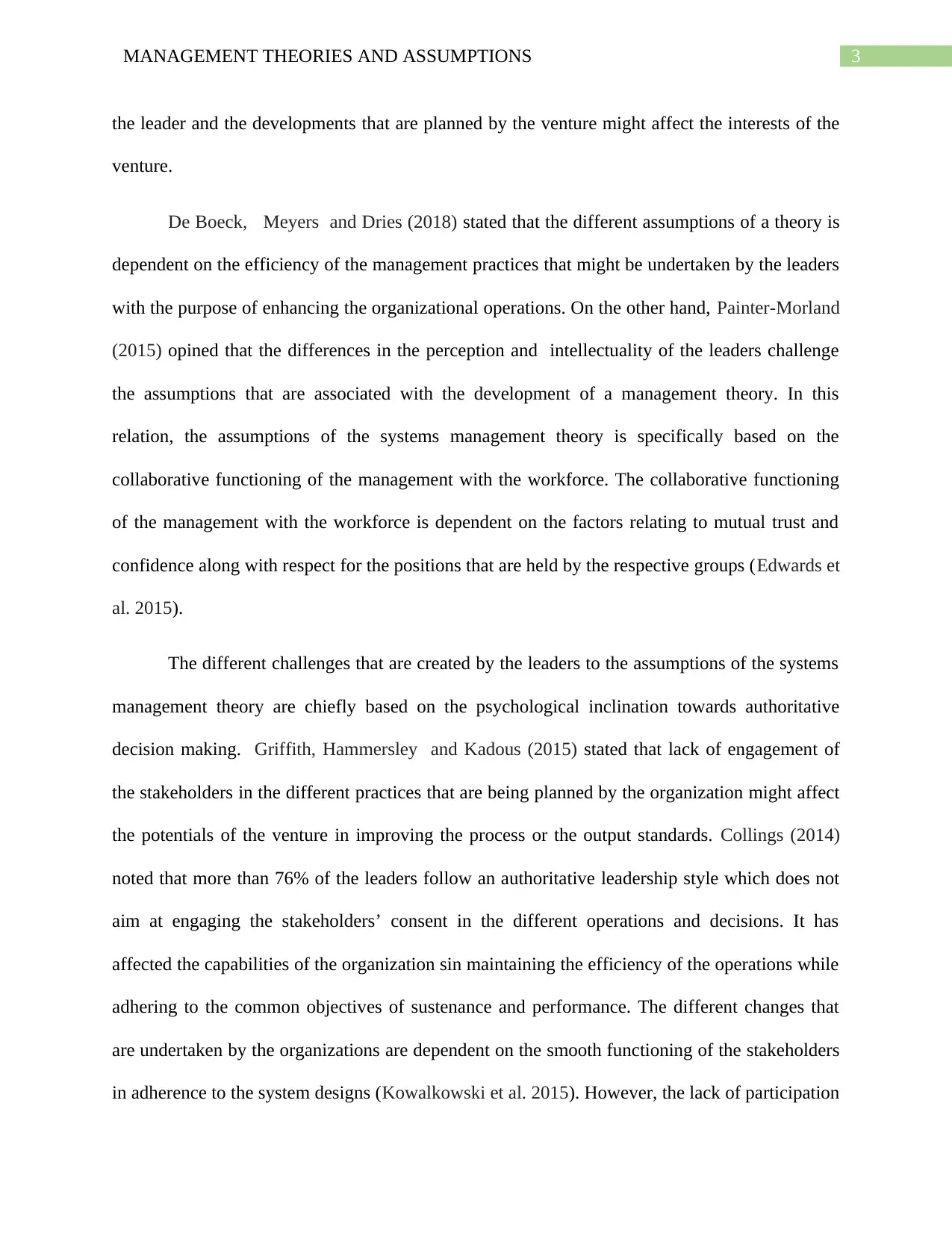
3MANAGEMENT THEORIES AND ASSUMPTIONS
the leader and the developments that are planned by the venture might affect the interests of the
venture.
De Boeck, Meyers and Dries (2018) stated that the different assumptions of a theory is
dependent on the efficiency of the management practices that might be undertaken by the leaders
with the purpose of enhancing the organizational operations. On the other hand, Painter-Morland
(2015) opined that the differences in the perception and intellectuality of the leaders challenge
the assumptions that are associated with the development of a management theory. In this
relation, the assumptions of the systems management theory is specifically based on the
collaborative functioning of the management with the workforce. The collaborative functioning
of the management with the workforce is dependent on the factors relating to mutual trust and
confidence along with respect for the positions that are held by the respective groups (Edwards et
al. 2015).
The different challenges that are created by the leaders to the assumptions of the systems
management theory are chiefly based on the psychological inclination towards authoritative
decision making. Griffith, Hammersley and Kadous (2015) stated that lack of engagement of
the stakeholders in the different practices that are being planned by the organization might affect
the potentials of the venture in improving the process or the output standards. Collings (2014)
noted that more than 76% of the leaders follow an authoritative leadership style which does not
aim at engaging the stakeholders’ consent in the different operations and decisions. It has
affected the capabilities of the organization sin maintaining the efficiency of the operations while
adhering to the common objectives of sustenance and performance. The different changes that
are undertaken by the organizations are dependent on the smooth functioning of the stakeholders
in adherence to the system designs (Kowalkowski et al. 2015). However, the lack of participation
the leader and the developments that are planned by the venture might affect the interests of the
venture.
De Boeck, Meyers and Dries (2018) stated that the different assumptions of a theory is
dependent on the efficiency of the management practices that might be undertaken by the leaders
with the purpose of enhancing the organizational operations. On the other hand, Painter-Morland
(2015) opined that the differences in the perception and intellectuality of the leaders challenge
the assumptions that are associated with the development of a management theory. In this
relation, the assumptions of the systems management theory is specifically based on the
collaborative functioning of the management with the workforce. The collaborative functioning
of the management with the workforce is dependent on the factors relating to mutual trust and
confidence along with respect for the positions that are held by the respective groups (Edwards et
al. 2015).
The different challenges that are created by the leaders to the assumptions of the systems
management theory are chiefly based on the psychological inclination towards authoritative
decision making. Griffith, Hammersley and Kadous (2015) stated that lack of engagement of
the stakeholders in the different practices that are being planned by the organization might affect
the potentials of the venture in improving the process or the output standards. Collings (2014)
noted that more than 76% of the leaders follow an authoritative leadership style which does not
aim at engaging the stakeholders’ consent in the different operations and decisions. It has
affected the capabilities of the organization sin maintaining the efficiency of the operations while
adhering to the common objectives of sustenance and performance. The different changes that
are undertaken by the organizations are dependent on the smooth functioning of the stakeholders
in adherence to the system designs (Kowalkowski et al. 2015). However, the lack of participation
Paraphrase This Document
Need a fresh take? Get an instant paraphrase of this document with our AI Paraphraser
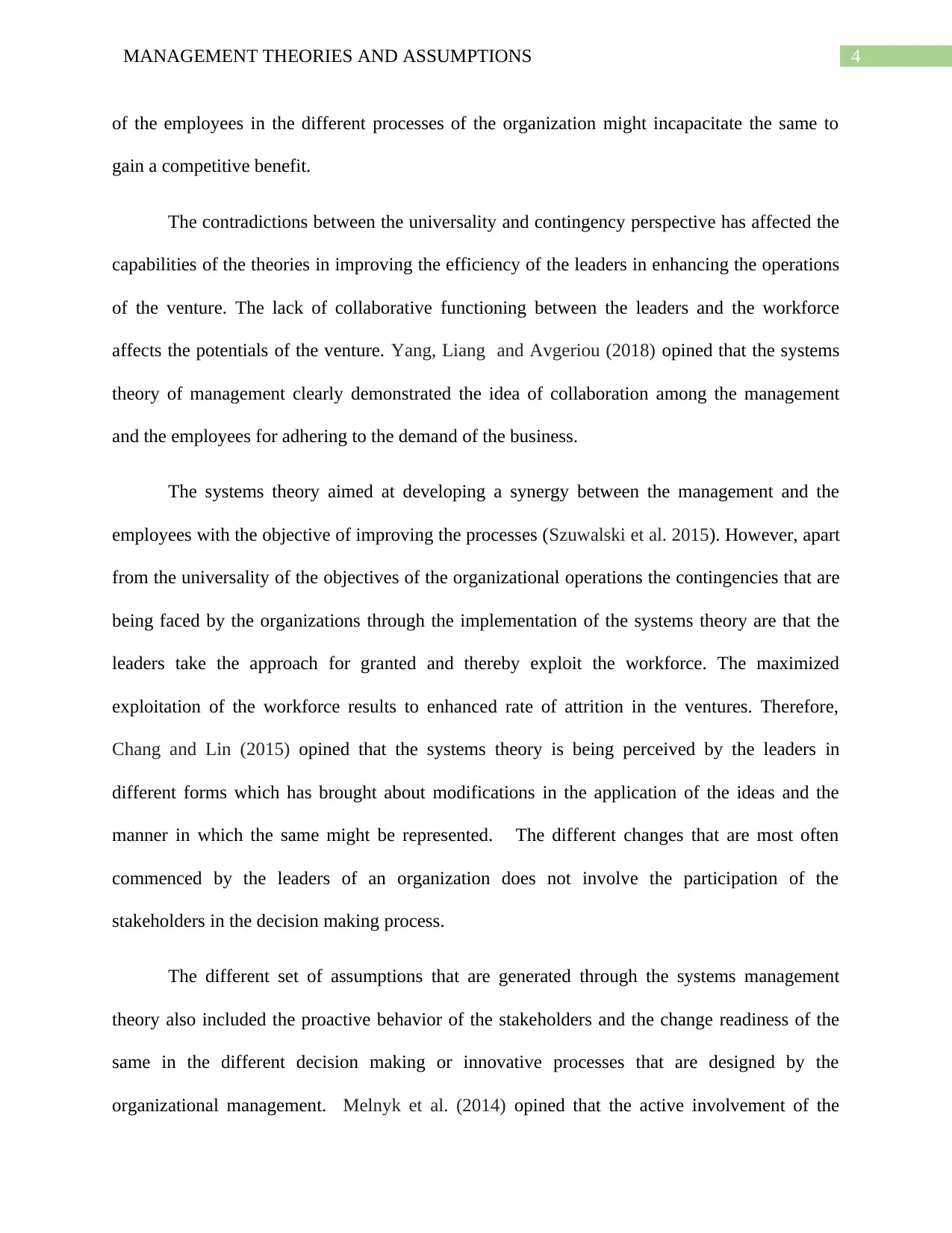
4MANAGEMENT THEORIES AND ASSUMPTIONS
of the employees in the different processes of the organization might incapacitate the same to
gain a competitive benefit.
The contradictions between the universality and contingency perspective has affected the
capabilities of the theories in improving the efficiency of the leaders in enhancing the operations
of the venture. The lack of collaborative functioning between the leaders and the workforce
affects the potentials of the venture. Yang, Liang and Avgeriou (2018) opined that the systems
theory of management clearly demonstrated the idea of collaboration among the management
and the employees for adhering to the demand of the business.
The systems theory aimed at developing a synergy between the management and the
employees with the objective of improving the processes (Szuwalski et al. 2015). However, apart
from the universality of the objectives of the organizational operations the contingencies that are
being faced by the organizations through the implementation of the systems theory are that the
leaders take the approach for granted and thereby exploit the workforce. The maximized
exploitation of the workforce results to enhanced rate of attrition in the ventures. Therefore,
Chang and Lin (2015) opined that the systems theory is being perceived by the leaders in
different forms which has brought about modifications in the application of the ideas and the
manner in which the same might be represented. The different changes that are most often
commenced by the leaders of an organization does not involve the participation of the
stakeholders in the decision making process.
The different set of assumptions that are generated through the systems management
theory also included the proactive behavior of the stakeholders and the change readiness of the
same in the different decision making or innovative processes that are designed by the
organizational management. Melnyk et al. (2014) opined that the active involvement of the
of the employees in the different processes of the organization might incapacitate the same to
gain a competitive benefit.
The contradictions between the universality and contingency perspective has affected the
capabilities of the theories in improving the efficiency of the leaders in enhancing the operations
of the venture. The lack of collaborative functioning between the leaders and the workforce
affects the potentials of the venture. Yang, Liang and Avgeriou (2018) opined that the systems
theory of management clearly demonstrated the idea of collaboration among the management
and the employees for adhering to the demand of the business.
The systems theory aimed at developing a synergy between the management and the
employees with the objective of improving the processes (Szuwalski et al. 2015). However, apart
from the universality of the objectives of the organizational operations the contingencies that are
being faced by the organizations through the implementation of the systems theory are that the
leaders take the approach for granted and thereby exploit the workforce. The maximized
exploitation of the workforce results to enhanced rate of attrition in the ventures. Therefore,
Chang and Lin (2015) opined that the systems theory is being perceived by the leaders in
different forms which has brought about modifications in the application of the ideas and the
manner in which the same might be represented. The different changes that are most often
commenced by the leaders of an organization does not involve the participation of the
stakeholders in the decision making process.
The different set of assumptions that are generated through the systems management
theory also included the proactive behavior of the stakeholders and the change readiness of the
same in the different decision making or innovative processes that are designed by the
organizational management. Melnyk et al. (2014) opined that the active involvement of the
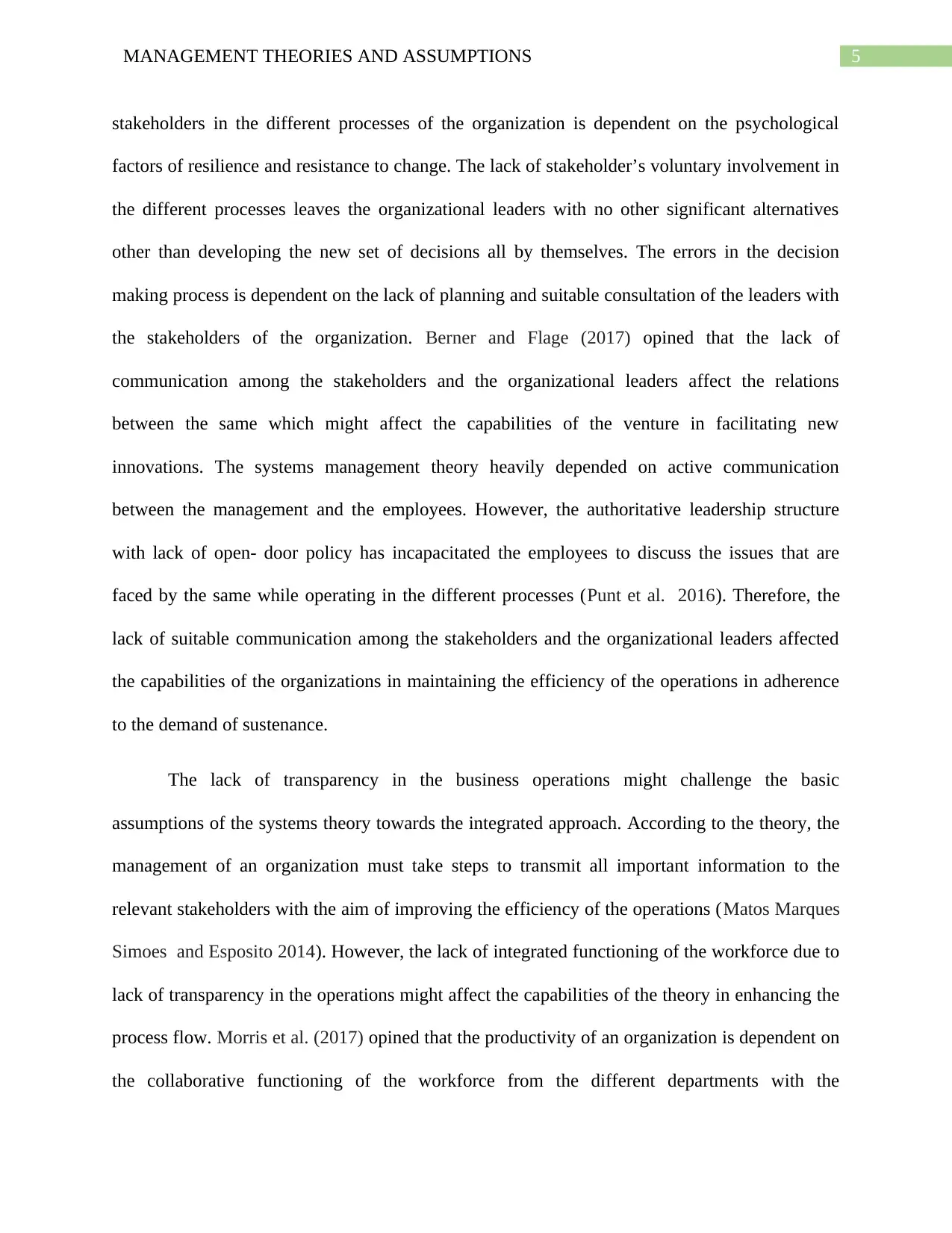
5MANAGEMENT THEORIES AND ASSUMPTIONS
stakeholders in the different processes of the organization is dependent on the psychological
factors of resilience and resistance to change. The lack of stakeholder’s voluntary involvement in
the different processes leaves the organizational leaders with no other significant alternatives
other than developing the new set of decisions all by themselves. The errors in the decision
making process is dependent on the lack of planning and suitable consultation of the leaders with
the stakeholders of the organization. Berner and Flage (2017) opined that the lack of
communication among the stakeholders and the organizational leaders affect the relations
between the same which might affect the capabilities of the venture in facilitating new
innovations. The systems management theory heavily depended on active communication
between the management and the employees. However, the authoritative leadership structure
with lack of open- door policy has incapacitated the employees to discuss the issues that are
faced by the same while operating in the different processes (Punt et al. 2016). Therefore, the
lack of suitable communication among the stakeholders and the organizational leaders affected
the capabilities of the organizations in maintaining the efficiency of the operations in adherence
to the demand of sustenance.
The lack of transparency in the business operations might challenge the basic
assumptions of the systems theory towards the integrated approach. According to the theory, the
management of an organization must take steps to transmit all important information to the
relevant stakeholders with the aim of improving the efficiency of the operations (Matos Marques
Simoes and Esposito 2014). However, the lack of integrated functioning of the workforce due to
lack of transparency in the operations might affect the capabilities of the theory in enhancing the
process flow. Morris et al. (2017) opined that the productivity of an organization is dependent on
the collaborative functioning of the workforce from the different departments with the
stakeholders in the different processes of the organization is dependent on the psychological
factors of resilience and resistance to change. The lack of stakeholder’s voluntary involvement in
the different processes leaves the organizational leaders with no other significant alternatives
other than developing the new set of decisions all by themselves. The errors in the decision
making process is dependent on the lack of planning and suitable consultation of the leaders with
the stakeholders of the organization. Berner and Flage (2017) opined that the lack of
communication among the stakeholders and the organizational leaders affect the relations
between the same which might affect the capabilities of the venture in facilitating new
innovations. The systems management theory heavily depended on active communication
between the management and the employees. However, the authoritative leadership structure
with lack of open- door policy has incapacitated the employees to discuss the issues that are
faced by the same while operating in the different processes (Punt et al. 2016). Therefore, the
lack of suitable communication among the stakeholders and the organizational leaders affected
the capabilities of the organizations in maintaining the efficiency of the operations in adherence
to the demand of sustenance.
The lack of transparency in the business operations might challenge the basic
assumptions of the systems theory towards the integrated approach. According to the theory, the
management of an organization must take steps to transmit all important information to the
relevant stakeholders with the aim of improving the efficiency of the operations (Matos Marques
Simoes and Esposito 2014). However, the lack of integrated functioning of the workforce due to
lack of transparency in the operations might affect the capabilities of the theory in enhancing the
process flow. Morris et al. (2017) opined that the productivity of an organization is dependent on
the collaborative functioning of the workforce from the different departments with the
⊘ This is a preview!⊘
Do you want full access?
Subscribe today to unlock all pages.

Trusted by 1+ million students worldwide
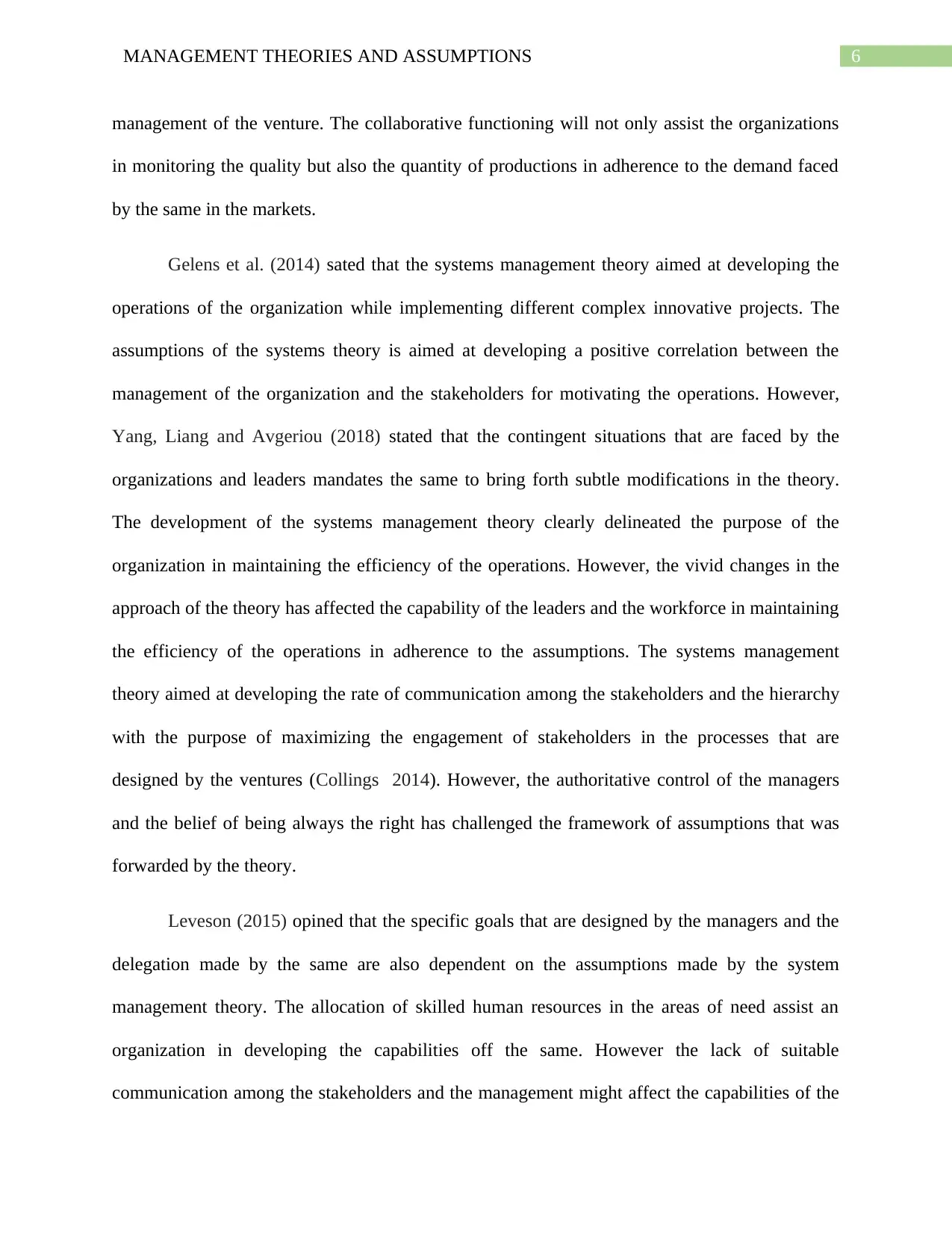
6MANAGEMENT THEORIES AND ASSUMPTIONS
management of the venture. The collaborative functioning will not only assist the organizations
in monitoring the quality but also the quantity of productions in adherence to the demand faced
by the same in the markets.
Gelens et al. (2014) sated that the systems management theory aimed at developing the
operations of the organization while implementing different complex innovative projects. The
assumptions of the systems theory is aimed at developing a positive correlation between the
management of the organization and the stakeholders for motivating the operations. However,
Yang, Liang and Avgeriou (2018) stated that the contingent situations that are faced by the
organizations and leaders mandates the same to bring forth subtle modifications in the theory.
The development of the systems management theory clearly delineated the purpose of the
organization in maintaining the efficiency of the operations. However, the vivid changes in the
approach of the theory has affected the capability of the leaders and the workforce in maintaining
the efficiency of the operations in adherence to the assumptions. The systems management
theory aimed at developing the rate of communication among the stakeholders and the hierarchy
with the purpose of maximizing the engagement of stakeholders in the processes that are
designed by the ventures (Collings 2014). However, the authoritative control of the managers
and the belief of being always the right has challenged the framework of assumptions that was
forwarded by the theory.
Leveson (2015) opined that the specific goals that are designed by the managers and the
delegation made by the same are also dependent on the assumptions made by the system
management theory. The allocation of skilled human resources in the areas of need assist an
organization in developing the capabilities off the same. However the lack of suitable
communication among the stakeholders and the management might affect the capabilities of the
management of the venture. The collaborative functioning will not only assist the organizations
in monitoring the quality but also the quantity of productions in adherence to the demand faced
by the same in the markets.
Gelens et al. (2014) sated that the systems management theory aimed at developing the
operations of the organization while implementing different complex innovative projects. The
assumptions of the systems theory is aimed at developing a positive correlation between the
management of the organization and the stakeholders for motivating the operations. However,
Yang, Liang and Avgeriou (2018) stated that the contingent situations that are faced by the
organizations and leaders mandates the same to bring forth subtle modifications in the theory.
The development of the systems management theory clearly delineated the purpose of the
organization in maintaining the efficiency of the operations. However, the vivid changes in the
approach of the theory has affected the capability of the leaders and the workforce in maintaining
the efficiency of the operations in adherence to the assumptions. The systems management
theory aimed at developing the rate of communication among the stakeholders and the hierarchy
with the purpose of maximizing the engagement of stakeholders in the processes that are
designed by the ventures (Collings 2014). However, the authoritative control of the managers
and the belief of being always the right has challenged the framework of assumptions that was
forwarded by the theory.
Leveson (2015) opined that the specific goals that are designed by the managers and the
delegation made by the same are also dependent on the assumptions made by the system
management theory. The allocation of skilled human resources in the areas of need assist an
organization in developing the capabilities off the same. However the lack of suitable
communication among the stakeholders and the management might affect the capabilities of the
Paraphrase This Document
Need a fresh take? Get an instant paraphrase of this document with our AI Paraphraser
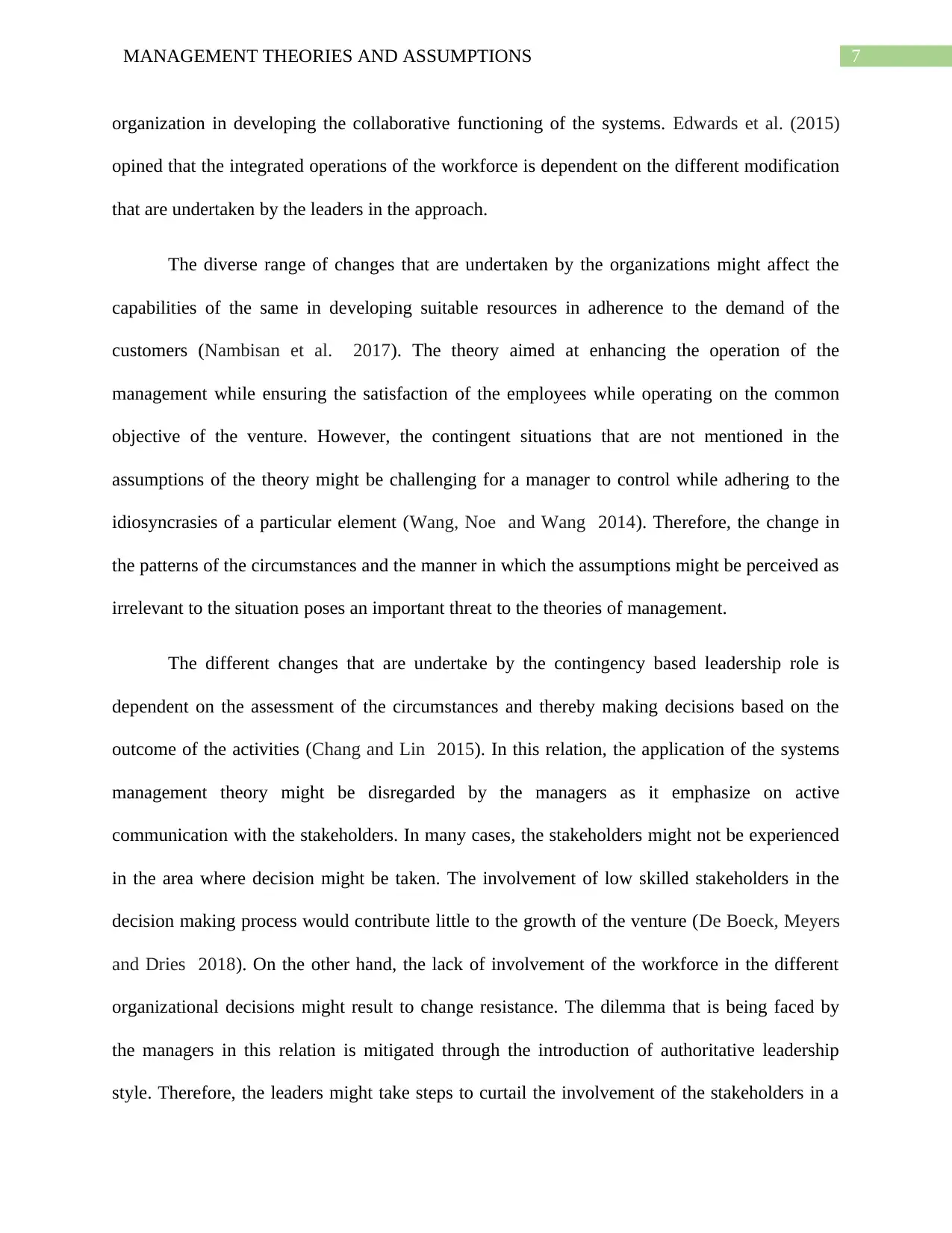
7MANAGEMENT THEORIES AND ASSUMPTIONS
organization in developing the collaborative functioning of the systems. Edwards et al. (2015)
opined that the integrated operations of the workforce is dependent on the different modification
that are undertaken by the leaders in the approach.
The diverse range of changes that are undertaken by the organizations might affect the
capabilities of the same in developing suitable resources in adherence to the demand of the
customers (Nambisan et al. 2017). The theory aimed at enhancing the operation of the
management while ensuring the satisfaction of the employees while operating on the common
objective of the venture. However, the contingent situations that are not mentioned in the
assumptions of the theory might be challenging for a manager to control while adhering to the
idiosyncrasies of a particular element (Wang, Noe and Wang 2014). Therefore, the change in
the patterns of the circumstances and the manner in which the assumptions might be perceived as
irrelevant to the situation poses an important threat to the theories of management.
The different changes that are undertake by the contingency based leadership role is
dependent on the assessment of the circumstances and thereby making decisions based on the
outcome of the activities (Chang and Lin 2015). In this relation, the application of the systems
management theory might be disregarded by the managers as it emphasize on active
communication with the stakeholders. In many cases, the stakeholders might not be experienced
in the area where decision might be taken. The involvement of low skilled stakeholders in the
decision making process would contribute little to the growth of the venture (De Boeck, Meyers
and Dries 2018). On the other hand, the lack of involvement of the workforce in the different
organizational decisions might result to change resistance. The dilemma that is being faced by
the managers in this relation is mitigated through the introduction of authoritative leadership
style. Therefore, the leaders might take steps to curtail the involvement of the stakeholders in a
organization in developing the collaborative functioning of the systems. Edwards et al. (2015)
opined that the integrated operations of the workforce is dependent on the different modification
that are undertaken by the leaders in the approach.
The diverse range of changes that are undertaken by the organizations might affect the
capabilities of the same in developing suitable resources in adherence to the demand of the
customers (Nambisan et al. 2017). The theory aimed at enhancing the operation of the
management while ensuring the satisfaction of the employees while operating on the common
objective of the venture. However, the contingent situations that are not mentioned in the
assumptions of the theory might be challenging for a manager to control while adhering to the
idiosyncrasies of a particular element (Wang, Noe and Wang 2014). Therefore, the change in
the patterns of the circumstances and the manner in which the assumptions might be perceived as
irrelevant to the situation poses an important threat to the theories of management.
The different changes that are undertake by the contingency based leadership role is
dependent on the assessment of the circumstances and thereby making decisions based on the
outcome of the activities (Chang and Lin 2015). In this relation, the application of the systems
management theory might be disregarded by the managers as it emphasize on active
communication with the stakeholders. In many cases, the stakeholders might not be experienced
in the area where decision might be taken. The involvement of low skilled stakeholders in the
decision making process would contribute little to the growth of the venture (De Boeck, Meyers
and Dries 2018). On the other hand, the lack of involvement of the workforce in the different
organizational decisions might result to change resistance. The dilemma that is being faced by
the managers in this relation is mitigated through the introduction of authoritative leadership
style. Therefore, the leaders might take steps to curtail the involvement of the stakeholders in a
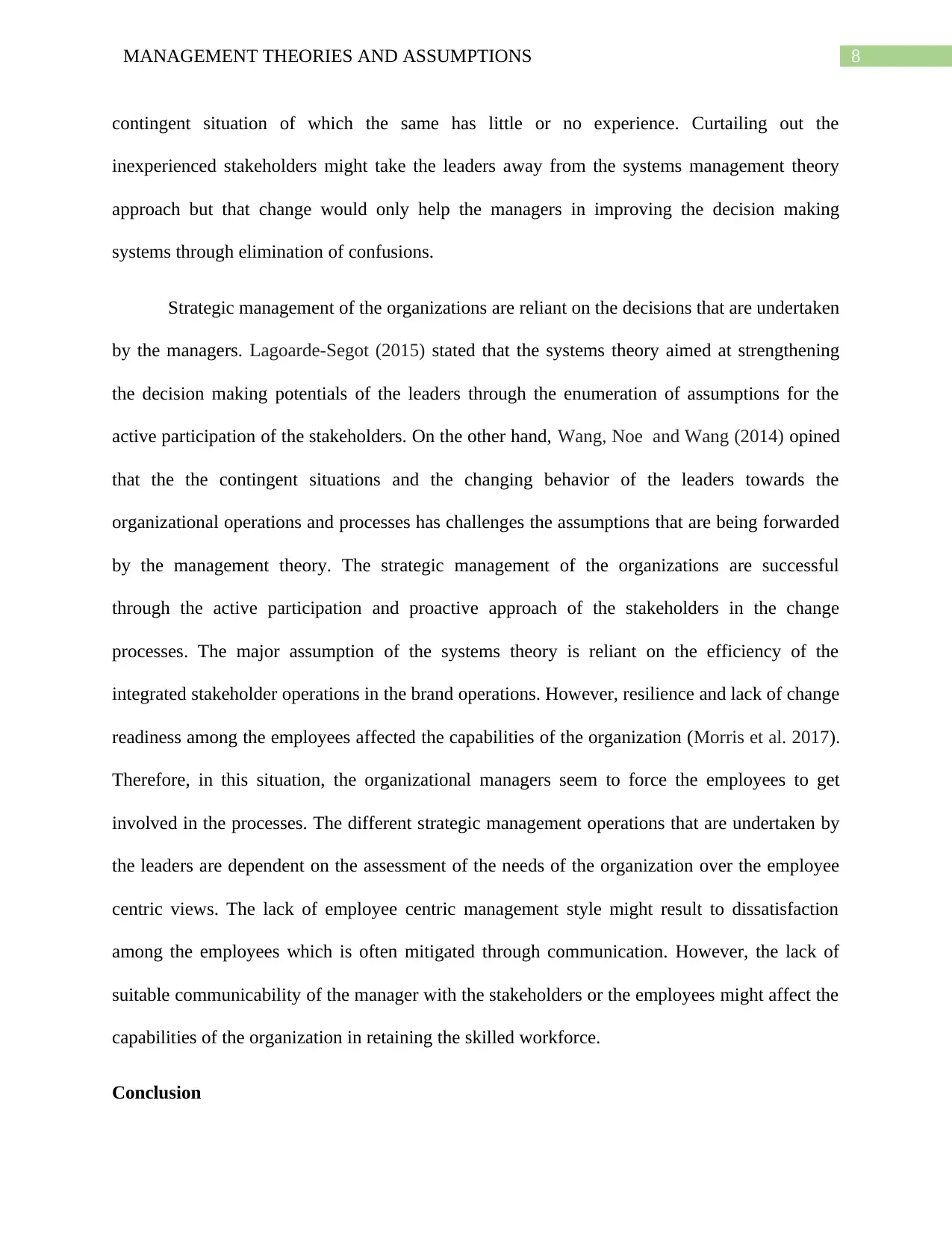
8MANAGEMENT THEORIES AND ASSUMPTIONS
contingent situation of which the same has little or no experience. Curtailing out the
inexperienced stakeholders might take the leaders away from the systems management theory
approach but that change would only help the managers in improving the decision making
systems through elimination of confusions.
Strategic management of the organizations are reliant on the decisions that are undertaken
by the managers. Lagoarde-Segot (2015) stated that the systems theory aimed at strengthening
the decision making potentials of the leaders through the enumeration of assumptions for the
active participation of the stakeholders. On the other hand, Wang, Noe and Wang (2014) opined
that the the contingent situations and the changing behavior of the leaders towards the
organizational operations and processes has challenges the assumptions that are being forwarded
by the management theory. The strategic management of the organizations are successful
through the active participation and proactive approach of the stakeholders in the change
processes. The major assumption of the systems theory is reliant on the efficiency of the
integrated stakeholder operations in the brand operations. However, resilience and lack of change
readiness among the employees affected the capabilities of the organization (Morris et al. 2017).
Therefore, in this situation, the organizational managers seem to force the employees to get
involved in the processes. The different strategic management operations that are undertaken by
the leaders are dependent on the assessment of the needs of the organization over the employee
centric views. The lack of employee centric management style might result to dissatisfaction
among the employees which is often mitigated through communication. However, the lack of
suitable communicability of the manager with the stakeholders or the employees might affect the
capabilities of the organization in retaining the skilled workforce.
Conclusion
contingent situation of which the same has little or no experience. Curtailing out the
inexperienced stakeholders might take the leaders away from the systems management theory
approach but that change would only help the managers in improving the decision making
systems through elimination of confusions.
Strategic management of the organizations are reliant on the decisions that are undertaken
by the managers. Lagoarde-Segot (2015) stated that the systems theory aimed at strengthening
the decision making potentials of the leaders through the enumeration of assumptions for the
active participation of the stakeholders. On the other hand, Wang, Noe and Wang (2014) opined
that the the contingent situations and the changing behavior of the leaders towards the
organizational operations and processes has challenges the assumptions that are being forwarded
by the management theory. The strategic management of the organizations are successful
through the active participation and proactive approach of the stakeholders in the change
processes. The major assumption of the systems theory is reliant on the efficiency of the
integrated stakeholder operations in the brand operations. However, resilience and lack of change
readiness among the employees affected the capabilities of the organization (Morris et al. 2017).
Therefore, in this situation, the organizational managers seem to force the employees to get
involved in the processes. The different strategic management operations that are undertaken by
the leaders are dependent on the assessment of the needs of the organization over the employee
centric views. The lack of employee centric management style might result to dissatisfaction
among the employees which is often mitigated through communication. However, the lack of
suitable communicability of the manager with the stakeholders or the employees might affect the
capabilities of the organization in retaining the skilled workforce.
Conclusion
⊘ This is a preview!⊘
Do you want full access?
Subscribe today to unlock all pages.

Trusted by 1+ million students worldwide
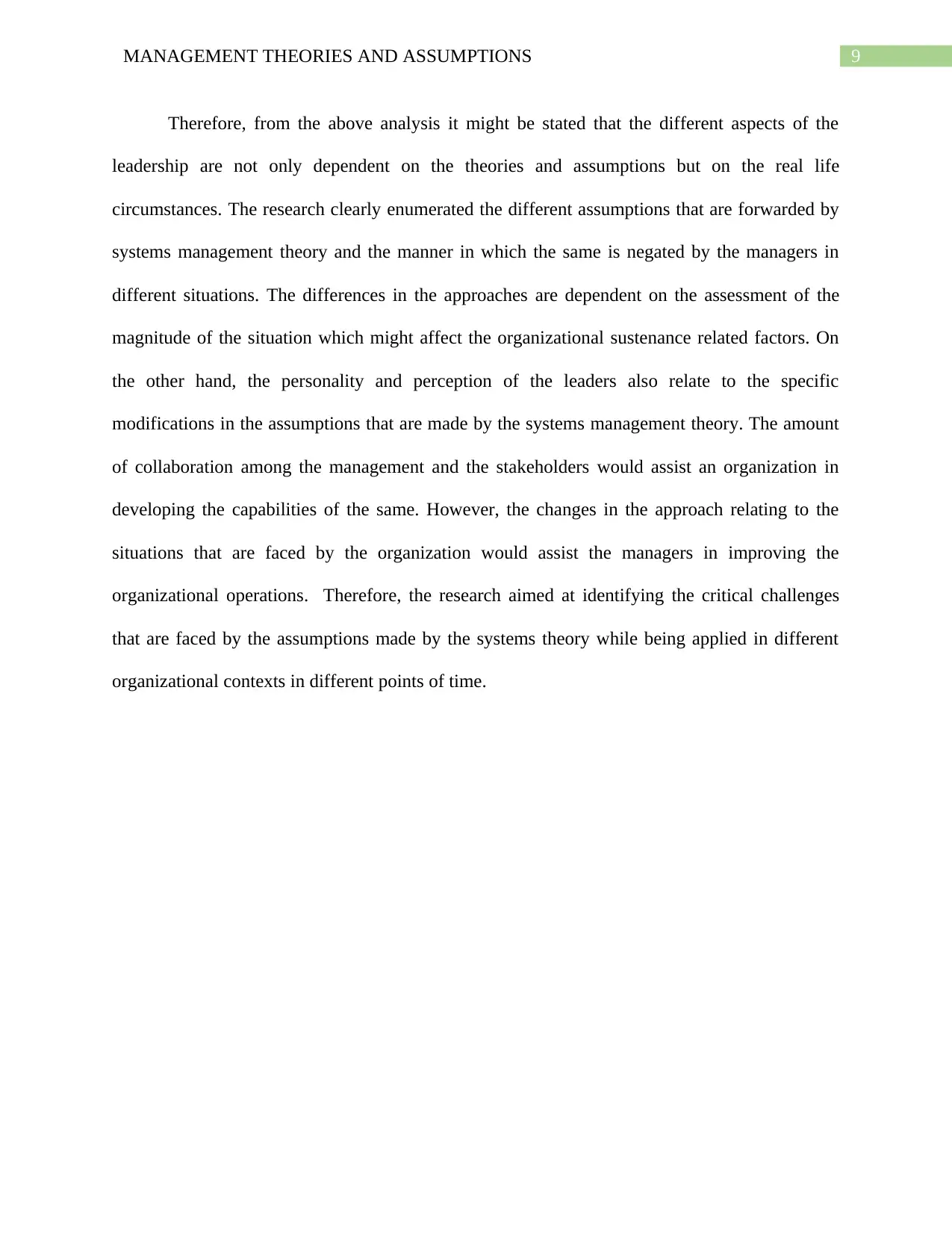
9MANAGEMENT THEORIES AND ASSUMPTIONS
Therefore, from the above analysis it might be stated that the different aspects of the
leadership are not only dependent on the theories and assumptions but on the real life
circumstances. The research clearly enumerated the different assumptions that are forwarded by
systems management theory and the manner in which the same is negated by the managers in
different situations. The differences in the approaches are dependent on the assessment of the
magnitude of the situation which might affect the organizational sustenance related factors. On
the other hand, the personality and perception of the leaders also relate to the specific
modifications in the assumptions that are made by the systems management theory. The amount
of collaboration among the management and the stakeholders would assist an organization in
developing the capabilities of the same. However, the changes in the approach relating to the
situations that are faced by the organization would assist the managers in improving the
organizational operations. Therefore, the research aimed at identifying the critical challenges
that are faced by the assumptions made by the systems theory while being applied in different
organizational contexts in different points of time.
Therefore, from the above analysis it might be stated that the different aspects of the
leadership are not only dependent on the theories and assumptions but on the real life
circumstances. The research clearly enumerated the different assumptions that are forwarded by
systems management theory and the manner in which the same is negated by the managers in
different situations. The differences in the approaches are dependent on the assessment of the
magnitude of the situation which might affect the organizational sustenance related factors. On
the other hand, the personality and perception of the leaders also relate to the specific
modifications in the assumptions that are made by the systems management theory. The amount
of collaboration among the management and the stakeholders would assist an organization in
developing the capabilities of the same. However, the changes in the approach relating to the
situations that are faced by the organization would assist the managers in improving the
organizational operations. Therefore, the research aimed at identifying the critical challenges
that are faced by the assumptions made by the systems theory while being applied in different
organizational contexts in different points of time.
Paraphrase This Document
Need a fresh take? Get an instant paraphrase of this document with our AI Paraphraser
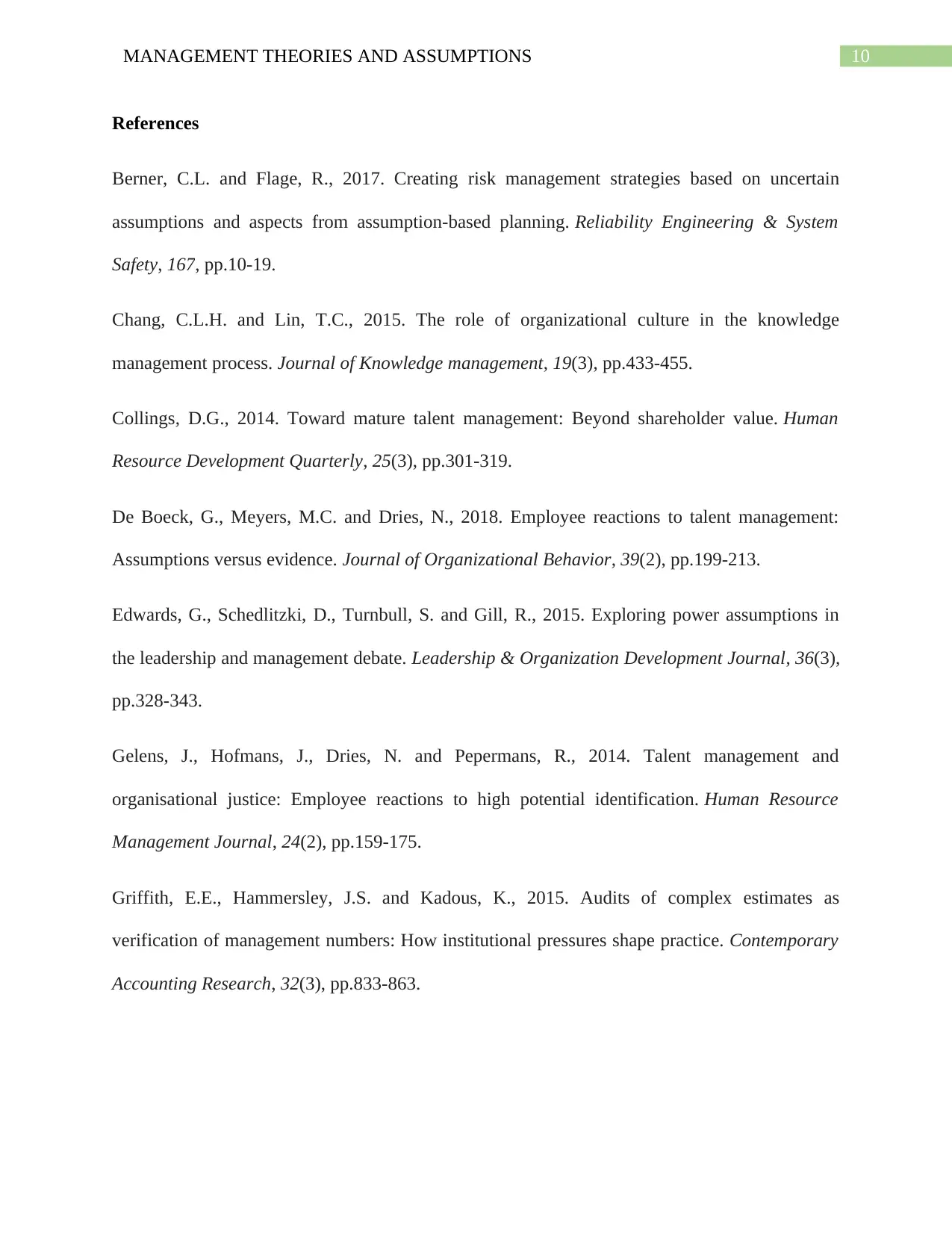
10MANAGEMENT THEORIES AND ASSUMPTIONS
References
Berner, C.L. and Flage, R., 2017. Creating risk management strategies based on uncertain
assumptions and aspects from assumption-based planning. Reliability Engineering & System
Safety, 167, pp.10-19.
Chang, C.L.H. and Lin, T.C., 2015. The role of organizational culture in the knowledge
management process. Journal of Knowledge management, 19(3), pp.433-455.
Collings, D.G., 2014. Toward mature talent management: Beyond shareholder value. Human
Resource Development Quarterly, 25(3), pp.301-319.
De Boeck, G., Meyers, M.C. and Dries, N., 2018. Employee reactions to talent management:
Assumptions versus evidence. Journal of Organizational Behavior, 39(2), pp.199-213.
Edwards, G., Schedlitzki, D., Turnbull, S. and Gill, R., 2015. Exploring power assumptions in
the leadership and management debate. Leadership & Organization Development Journal, 36(3),
pp.328-343.
Gelens, J., Hofmans, J., Dries, N. and Pepermans, R., 2014. Talent management and
organisational justice: Employee reactions to high potential identification. Human Resource
Management Journal, 24(2), pp.159-175.
Griffith, E.E., Hammersley, J.S. and Kadous, K., 2015. Audits of complex estimates as
verification of management numbers: How institutional pressures shape practice. Contemporary
Accounting Research, 32(3), pp.833-863.
References
Berner, C.L. and Flage, R., 2017. Creating risk management strategies based on uncertain
assumptions and aspects from assumption-based planning. Reliability Engineering & System
Safety, 167, pp.10-19.
Chang, C.L.H. and Lin, T.C., 2015. The role of organizational culture in the knowledge
management process. Journal of Knowledge management, 19(3), pp.433-455.
Collings, D.G., 2014. Toward mature talent management: Beyond shareholder value. Human
Resource Development Quarterly, 25(3), pp.301-319.
De Boeck, G., Meyers, M.C. and Dries, N., 2018. Employee reactions to talent management:
Assumptions versus evidence. Journal of Organizational Behavior, 39(2), pp.199-213.
Edwards, G., Schedlitzki, D., Turnbull, S. and Gill, R., 2015. Exploring power assumptions in
the leadership and management debate. Leadership & Organization Development Journal, 36(3),
pp.328-343.
Gelens, J., Hofmans, J., Dries, N. and Pepermans, R., 2014. Talent management and
organisational justice: Employee reactions to high potential identification. Human Resource
Management Journal, 24(2), pp.159-175.
Griffith, E.E., Hammersley, J.S. and Kadous, K., 2015. Audits of complex estimates as
verification of management numbers: How institutional pressures shape practice. Contemporary
Accounting Research, 32(3), pp.833-863.
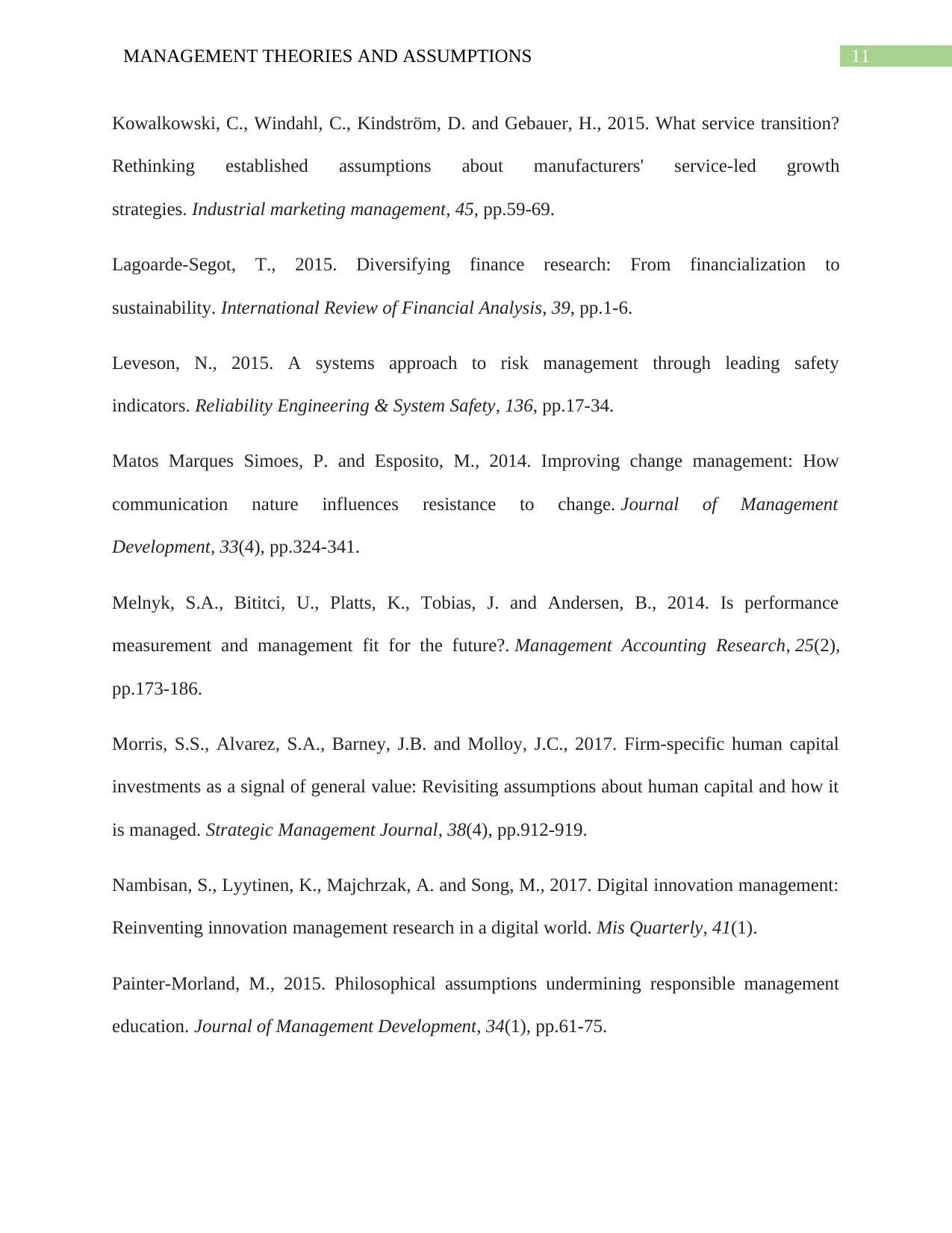
11MANAGEMENT THEORIES AND ASSUMPTIONS
Kowalkowski, C., Windahl, C., Kindström, D. and Gebauer, H., 2015. What service transition?
Rethinking established assumptions about manufacturers' service-led growth
strategies. Industrial marketing management, 45, pp.59-69.
Lagoarde-Segot, T., 2015. Diversifying finance research: From financialization to
sustainability. International Review of Financial Analysis, 39, pp.1-6.
Leveson, N., 2015. A systems approach to risk management through leading safety
indicators. Reliability Engineering & System Safety, 136, pp.17-34.
Matos Marques Simoes, P. and Esposito, M., 2014. Improving change management: How
communication nature influences resistance to change. Journal of Management
Development, 33(4), pp.324-341.
Melnyk, S.A., Bititci, U., Platts, K., Tobias, J. and Andersen, B., 2014. Is performance
measurement and management fit for the future?. Management Accounting Research, 25(2),
pp.173-186.
Morris, S.S., Alvarez, S.A., Barney, J.B. and Molloy, J.C., 2017. Firm‐specific human capital
investments as a signal of general value: Revisiting assumptions about human capital and how it
is managed. Strategic Management Journal, 38(4), pp.912-919.
Nambisan, S., Lyytinen, K., Majchrzak, A. and Song, M., 2017. Digital innovation management:
Reinventing innovation management research in a digital world. Mis Quarterly, 41(1).
Painter-Morland, M., 2015. Philosophical assumptions undermining responsible management
education. Journal of Management Development, 34(1), pp.61-75.
Kowalkowski, C., Windahl, C., Kindström, D. and Gebauer, H., 2015. What service transition?
Rethinking established assumptions about manufacturers' service-led growth
strategies. Industrial marketing management, 45, pp.59-69.
Lagoarde-Segot, T., 2015. Diversifying finance research: From financialization to
sustainability. International Review of Financial Analysis, 39, pp.1-6.
Leveson, N., 2015. A systems approach to risk management through leading safety
indicators. Reliability Engineering & System Safety, 136, pp.17-34.
Matos Marques Simoes, P. and Esposito, M., 2014. Improving change management: How
communication nature influences resistance to change. Journal of Management
Development, 33(4), pp.324-341.
Melnyk, S.A., Bititci, U., Platts, K., Tobias, J. and Andersen, B., 2014. Is performance
measurement and management fit for the future?. Management Accounting Research, 25(2),
pp.173-186.
Morris, S.S., Alvarez, S.A., Barney, J.B. and Molloy, J.C., 2017. Firm‐specific human capital
investments as a signal of general value: Revisiting assumptions about human capital and how it
is managed. Strategic Management Journal, 38(4), pp.912-919.
Nambisan, S., Lyytinen, K., Majchrzak, A. and Song, M., 2017. Digital innovation management:
Reinventing innovation management research in a digital world. Mis Quarterly, 41(1).
Painter-Morland, M., 2015. Philosophical assumptions undermining responsible management
education. Journal of Management Development, 34(1), pp.61-75.
⊘ This is a preview!⊘
Do you want full access?
Subscribe today to unlock all pages.

Trusted by 1+ million students worldwide
1 out of 13
Related Documents
Your All-in-One AI-Powered Toolkit for Academic Success.
+13062052269
info@desklib.com
Available 24*7 on WhatsApp / Email
![[object Object]](/_next/static/media/star-bottom.7253800d.svg)
Unlock your academic potential
Copyright © 2020–2026 A2Z Services. All Rights Reserved. Developed and managed by ZUCOL.





